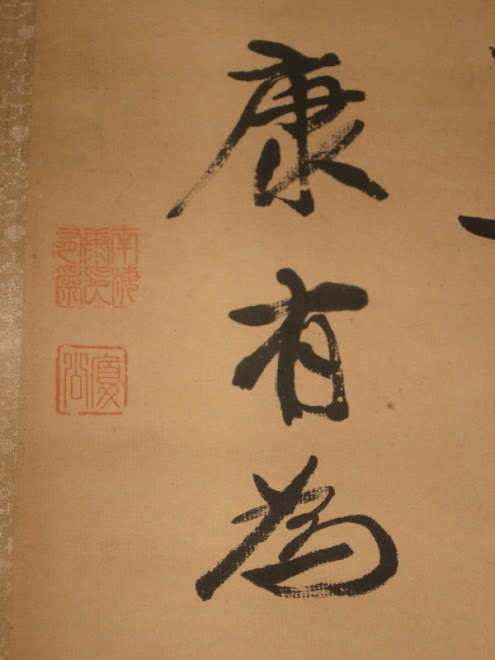A number of notable books in English about Kang Youwei and/or the Baohuanghui have been published in recent years. Given the transnational scope of Kang's life and political organization, his wide-ranging creative endeavors and intellectual output, the range of book topics is not surprising. Kang's concerns and the Baohuanghui's impact on Chinese lives and political aspirations, both in China and overseas, resonate today.
For each book, there is a link to an Open Access excerpt, book review, or online podcast or book talk.
The Baohuanghui
Transpacific Reform and Revolution: The Chinese in North America, 1898−1918 by Zhongping Chen (Stanford: Stanford University Press, 2023). Transpacific Reform and Revolution: A Conversation with Zhongping Chen is an interview article by Elisabeth Forster, Made in China Journal: "Zhongping Chen traces the networks in which reformers around Kang Youwei and revolutionaries around Sun Yat-sen operated. Chen focuses mostly on Canada and the United States. . . This is a fascinating study that shows Chinese reformers and revolutionaries of the period in an entirely new, much more pragmatic light. Chen discusses the status Kang and Sun had in their networks and the way these networks operated—from business activities and funding through membership fees, to the lawsuits they levelled against each other, and even assassinations." A recorded interview by Li-Ping Chen with Zhongping Chen is on the New Books Network.
Thoughts from the Ice-Drinker’s Studio: Essays on China and the World by Liang Qichao, translated and annotated by Peter Zarrow (London: Penguin Classics, 2023). The Baohuanghui ethos, symbolism, and concept of "citizenship" were heavily influenced by the political writings of Kang's most famous student, Liang Qichao. This book includes many influential articles from Liang's series, "The New Citizen." Political theorist Leigh Jenco writes, "Peter Zarrow has finally undertaken the considerable scholarly effort to translate, masterfully and lucidly, key essays from Liang Qichao 梁啟超, arguably the most influential figure of twentieth-century Chinese thought barring only Mao Zedong."
Kang as Confucian and Utopian Visionary
Science and the Confucian Religion of Kang Youwei (1858–1927): China before the Conflict Thesis by Wan Zhaoyuan (Leiden: Brill, 2021). Foreword to book by David Palmer: "Drawing on a detailed study of the writings of Kang and his associates and disciples, presented in the context of historical and political changes as they affected their personal lives, Wan shows that the ‘religious’, the ‘scientific’ and the ‘political’ dimensions of Kang’s life were inextricably intertwined, with events, experiences or new knowledge in one realm impacting on his thinking and action in the other realms."
Confucian Concord: Reform, Utopia and Global Teleology in Kang Youwei’s Datong Shu by Federico Brusadelli (Leiden: Brill, 2020). Review of Confucian Concord, Carine Defoort, Philosophy East and West 72, no. 2 (2022): 1-5: "Brusadelli’s two major claims are: first, that Kang’s Great Concord is profoundly rooted in Chinese intellectual trends and not primarily a response to the shock of Western intrusion; and second, that Datongshu is not some extreme, utopian fantasy but largely consistent with Kang’s other political writings. The combined claim is then that Great Concord is an important reflection on Chinese modernity."
Abolishing Boundaries: Global Utopias in the Formation of Modern Chinese Political Thought, 1880–1940 by Peter Zarrow (Albany: State University of New York Press. 2021). "Kang Youwei is the foundational figure of modern Chinese utopianism, but scholars have long wrestled with the question of how the same man could promote reformism--which was cautious and explicitly antirevolutionary--and also believe in a utopian vision that was in effect a revolutionary prognostication." Book talk, Center for East Asian Studies, Univ. of Wisconsin-Madison
Other Perspectives on Kang
The Other Kang Youwei: Calligrapher, Art Activist, and Aesthetic Reformer in Modern China by Aida Yuen Wong (Leiden: Brill, 2016). "Aida Yuen Wong’s new book pursues this confidently iconoclastic and determinedly original “other” Kang Youwei through deep analysis of previously understudied aspects of Kang’s life — his ink brush, aesthetic sensibility, and arts activism — deftly moving them from the sidelines of history into a central position and, in doing so, revealing how integral they had always been to Kang’s self-conceptualization and self- representation as a revolutionary social thinker." Lisa Claypool, review, China Review International 21, no. 2, 192-95
The Big Cheat (Da ma bian): A Late Qing Novel by Huang Shizhong on Kang Youwei by Luke S. K. Kwong (Leiden: Brill, 2023). "Debunking the Kang-centered narrative would be a requisite step towards a better understanding of the Hundred Days. Historical imagination of the episode has long fallen under the stupefying effects of received wisdom, and, in this sense, Huang Shizhong’s highly unflattering portrayal of Kang in Da ma bian, despite its obvious shortcomings, may be treated as a stimulant." Kwong, "Translator's Preface"
Kang's Travels
Kang Youwei Engages India: His Travel Narratives (1901–1902) and Predicaments of Civilization and Nation by Kamal Sheel and Ranjana Sheel, trans. and ed. (New York: Routledge, 2024). Kang spent about 17 months on two trips to India in 1901-03 and 1909. Excerpt from book preview: "This work is an annotated translation of Kang Youwei’s two significant narratives on India. One is his travelogue, entitled Yindu youji [Records of Travel to China], and the other is a long political letter-essay on India addressed to his closest disciple, Liang Qichao entitled Yu tongxue zhuzi Liang Qichao deng lun yindu wangguo youyu gesheng zili shu [Discussing India’s Extinction caused by Independence of its Provinces in a Letter to Liang Qichao, Colleagues, and Followers]. Published after Kang’s death, they provide a remarkable account of his perceptions of India as well as throw light on his thoughts on “nationalism,” “civilisation,” and “modernity.”

Thank you for these new very useful posts.
ReplyDelete